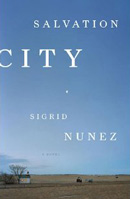

Riverhead, hardcover, 9781594487668
After a worldwide flu pandemic leaves him an orphan, young teen Cole Vining realizes that his life has taken him in an unexpected, and previously unimaginable, direction. In just a few months, he goes from living with urbanite parents to a new life with an evangelical pastor and his wife in small town Indiana, USA. Pastor Wyatt and his wife Tracy are the opposite of Cole's father and mother in many important ways. Whereas his parents were somewhat unhappy, worldly atheist intellectuals, his new "family" are cheerful non-intellectuals living an insular life in their Christian community. But with no one else to turn to, and the country in tatters, Cole finds sanctuary in Salvation City.
The description on the back cover of Salvation City gives the impression that Sigrid Nunez's book is a work of dystopian literature, an impression strengthened by use of the words "anarchic" and "vision of utopia." Nunez publicized this novel at the panel on dystopian literature at BookExpo America this past May, which will further influence readers' expectations. However, I found none of the expected markers of dystopian literature in Salvation City. Based on the technology the characters use (e-mail, iPods, SparkNotes), the story is apparently set in the very near future. Society is a skeleton of what we know now, and while there is some chaos, the social structure is fundamentally the same. There is no totalitarian regime imposing arbitrary deprivation and oppression. Dystopian novels in the past—such as Nineteen Eighty-four and The Handmaid's Tale—have served as social critique and as warning of possible futures if our behaviour does not change. There is none of that in Salvation City. Having been set up to look for it, I was puzzled and a bit disappointed when my expectations were not met. The premise held so much promise: how would the future look after the global pandemic we've been warned about is combined with Christian fundamentalists who believe they are living in end times? That sounded like a novel I wanted to read.
Yet that is not where Nunez takes us in this book. Granted, the people Cole ends up living with are what his mother would have called "Jesus freaks," but there is none of the intolerance, fear and general noodlyness that we associate with fundamentalists in the media. Salvation City certainly is not a dangerous cult of the Jim Jones or Heaven's Gate ilk. As Pastor Wyatt says, "we ain't the Taliban." He's not a fire-and-brimstone preacher because he thinks the world has seen enough fear. According to him, it is the devil who is the enemy—not other people.
What this novel is actually about is an exploration of what might happen if a child is suddenly taken from one culture and placed
into a different—and, in many ways, a competing—culture. Cole is old enough to have understood and absorbed some of
his parents' ideas, and he is beginning to develop his own world view when he is abruptly plunked into a world with a clashing
ideology. The novel is also a character-driven story about families and growing up. Cole is a typical thirteen-year-old boy
struggling with fears of his emotions, with mixed feelings toward his parents, and with managing affection. When I put aside
my dystopian expectations and looked at the novel Nunez actually wrote, I liked it much better. Her characters are interesting
and complex, and she eschews stereotypes. Even Pastor Wyatt's wife Tracy, who at first comes across as a narrow-minded, incompetent
home schooler who doesn't value education, becomes somewhat likeable by the end of the book because of her compassion and loyalty. In
this contrast of contested ideologies in the United States today, Nunez does not pass judgment, but gives us believable, reasonable
characters on both sides.
